Olympia start-up reels in local investors, luring dollars to Main Street rather than Wall Street
Local outdoor gear company Trxstle set to manufacture their first run of innovative rod and reel carriers after attracting investors through the new Thurston Investment Network (ThINk).
It was like Shark Tank. Self-proclaimed outdoor junkies John Smigaj and Morgan Misek had an innovative product to pitch – an easily transportable fly rod and reel storage device – and they were casting for investors.
After a tremendous amount of preparation, John and Morgan pitched their idea to a room of more than a dozen potential investors, members of the new Thurston Investment Network (ThINk). The duo shared about their market research, manufacturing readiness, and the versatility and demand for a product like theirs that would let an angler transport two fully rigged fly rods on the top of their vehicle and then easily collapse it down.
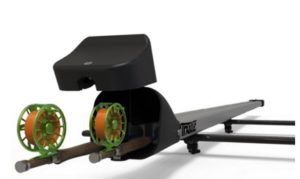 And they got a bite! Two ThINk members were interested in the Convertible Rod Carry System (CRC) and investing in their firm, Trxstle (pronounced “trestle”).
And they got a bite! Two ThINk members were interested in the Convertible Rod Carry System (CRC) and investing in their firm, Trxstle (pronounced “trestle”).
The company already has over 200 reservations for the CRC, many of them gained from their Instagram followers. “Instagram has been the best return for us…the best monetization of people. We are engaging with over 8,000 followers,” said John.
A great deal of feedback through social media helped guide the pair, both mechanical engineers, in creating a highly desirable product. The CRC’s innovative features include a weatherproof rod and reel liner, a fast, stowable clamping system, and multiple mounting lengths. The collapsible design allows it to be easily removed and tucked way, whether into a car at a trailhead or in a closet once back home. Its solid construction and portability lets it be easily checked in on a flight, but at 15 pounds still manageable to carry around.
With ThINk members’ investment, John and Morgan have the money to produce their first 1,000 CRCs and will have them ready for delivery in June. Between now then, they will also move to a new space on Pacific Avenue in Olympia to accommodate their operational, inventory, and distribution needs.
The Investors
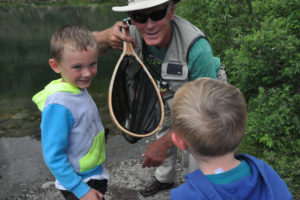 “I fly fish,” shared Gary Andrews, the primary investor. “Trxstle’s product struck me as something that was going to be wanted; I could see using it myself,” he said. “And listening to John and Morgan, I liked them as people and their background in design and manufacturing. It was clear they could put products together.”
“I fly fish,” shared Gary Andrews, the primary investor. “Trxstle’s product struck me as something that was going to be wanted; I could see using it myself,” he said. “And listening to John and Morgan, I liked them as people and their background in design and manufacturing. It was clear they could put products together.”
A retired attorney, Gary has been intimately involved in many startups locally, both as an attorney helping create their legal structures and personally as a small business owner himself. In addition to the Olympia law firm he had for 15 years, Gary owned a couple of local pet stores and is currently developing an 11-parcel residential cluster development near Walla Walla. A big thinker and community volunteer, Gary has also served as the Chairman of the Board for both the Thurston EDC and the Thurston County Chamber. In short, he has a good sense of what’s needed for a business to be successful.
Gary has also been passionate about investing in local business for more than 30 years.
In the 1980s, he worked to launch an investors’ exchange. It was designed as a type of angel group, connecting local accredited investors with local small businesses. “Security laws were a lot different then, and it was a lot harder to invest in local companies,” Gary shared.
Though it didn’t come to fruition, Gary stayed committed to the local investment idea, and in the early ‘90s was part of a team, along with the Thurston EDC, to pursue the Greater Thurston Partnership. It was designed as a small business investment company and needed to raise $2.5 million to launch. Although it fell short of the dollar goal, Gary’s interest in investing locally continued. He was quite excited when he learned the EDC was launching ThINk. He became a member, lending both his experience and his leadership to the effort.
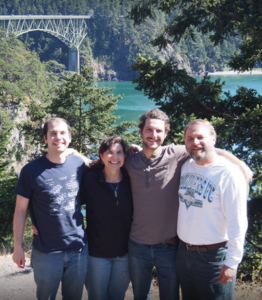 Celia Nightingale, the minority investor, is the director of the Center for Business & Innovation (CB&I), a partnership between the EDC and South Puget Sound Community College which supports business development, innovation and entrepreneurship. She had worked some with John and Morgan as they sought CB&I services, but it wasn’t until the pitch night that Celia decided to become an investor.
Celia Nightingale, the minority investor, is the director of the Center for Business & Innovation (CB&I), a partnership between the EDC and South Puget Sound Community College which supports business development, innovation and entrepreneurship. She had worked some with John and Morgan as they sought CB&I services, but it wasn’t until the pitch night that Celia decided to become an investor.
“They did an incredible amount of homework and are very thorough, coachable, and eager,” said Celia, who also thinks the technology is great. “I have confidence in their abilities and continued success,” she said.
Celia has worked for more than 20 years supporting local business growth and profitability through various organizations. As a strong believer in the local investment model, she decided to put some of her own money where her heart is and help further the development of ThINk. “Individuals can have an incredible impact on their communities by investing some of their funds locally rather than on Wall Street,” she said.
Gary and Celia had a couple follow-up meetings after the initial pitch, to further explore Trxstle’s business plan and other planned products. At the second meeting, they presented an offer letter to John and Morgan, and then Trxstle’s attorney drew up the legal agreement which included loan terms, equity, timelines, and milestones.
The benefit of the ThINk match beyond money
Many startups fail because they lack expertise in certain areas and they’re underfunded. This ThINk match has helped fill both those gaps for Trxstle.
John said, “The pitch process really forced us to put together a more detailed business plan and model for our next five to seven years. It really made us focus and get all our ducks in a row.”
In addition to the financial investment from Gary and Celia, the Trxstle owners see tremendous benefit in the knowledge that Gary and Celia bring to the table, serving as mentors and a “head check” for the two entrepreneurs. “They have great business advice in realms where we don’t have experience.”
More about Trxstle, its founders, and its name
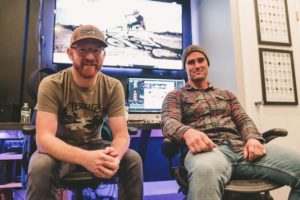 John and Morgan, former locomotive design engineers, named their company Trxstle as a play on words and a nod to their common history. Trestles help things transition and move forward. It’s how trains find their way through the mountains and over streams, where the cofounders find their favorite outdoor activities. The “x” replaces the “e” in the standard spelling to visually represent the braces that support a trestle.
John and Morgan, former locomotive design engineers, named their company Trxstle as a play on words and a nod to their common history. Trestles help things transition and move forward. It’s how trains find their way through the mountains and over streams, where the cofounders find their favorite outdoor activities. The “x” replaces the “e” in the standard spelling to visually represent the braces that support a trestle.
They’re not the only ones who see their outdoor activities crossing.
“We realized most people that enjoy playing outside enjoy doing so in more than one way,” said Morgan. “The multi-sport athlete and enthusiast is everywhere,” he said.
Trxstle is all about products to carry gear, and allowing people to combine their favorite activities, whether fly-fishing, surfing, biking, skiing or snowboarding.
“There are a lot of people who like to mountain bike or bike-pack, who also love to fly fish,” said Morgan. To meet that need, Trxstle’s targeting its next product to be a fly rod and reel carrier to fit on a high-end, full-suspension mountain bike. Other product ideas include hiking backpacks designed to carry equipment for destination activities, like skiing and snowboarding, river rafting, or surfing.
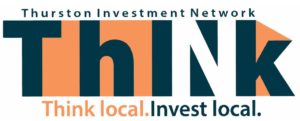
ThINk: The making of a local investment network
Many years before Aslan Meade became the Thurston Economic Development Council’s Business & Investor Relations Manager, he was a believer in the power 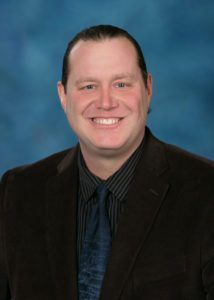 of keeping our money local. In 2012, Aslan was involved in a group of innovative thinkers who met as a local economy roundtable. This group researched Port Townsend’s Local Investing Opportunities Network (LION) and was impressed by a number of aspects, especially how the network captured investment dollars and drove that capital into the local economy, and specifically, directly into locally owned businesses that the community loved. Although a similar model sounded promising for Thurston County, the roundtable didn’t have the capacity to administer such a network.
of keeping our money local. In 2012, Aslan was involved in a group of innovative thinkers who met as a local economy roundtable. This group researched Port Townsend’s Local Investing Opportunities Network (LION) and was impressed by a number of aspects, especially how the network captured investment dollars and drove that capital into the local economy, and specifically, directly into locally owned businesses that the community loved. Although a similar model sounded promising for Thurston County, the roundtable didn’t have the capacity to administer such a network.
Never giving up on the idea, in 2015 Aslan wrote a proposal suggesting that the Thurston EDC house a local investment network. The EDC was interested. To help with the creation of the network, Aslan brought in the Association of Washington Cities and Washington State University Extension’s Community and Economic Development team. These two groups were (and are) helping to bring local investment networks to cities and towns across the state.
In early 2016, Aslan started working at the EDC and the first “champion meeting” was held to gather local business owners & community leaders who would help spread the word and “champion” the local investment network model. “With help from the EDC Board, we spent the next year making sure everything was legal and sanctioned by the Department of Financial Institutions,” he said. Looking for a catchy name for the network, the group eventually came up with the Thurston Investment Network, or ThINk, encouraging Thurston investors to: ThINK Local. Invest Local.
Local attorney, Gary Andrews approved, “There’s so much synergy that can occur with the Economic Development Council and how they’re set up,” he said. After becoming a member of ThINk, Gary heard a pitch he liked in February and is now the primary investor in ThINk’s first match with outdoor gear company Trxstle.
Structurally, ThINk is a program of the EDC’s Center for Business & Innovation, which is partnered with, and located on, South Puget Sound Community College’s Lacey campus.
Should you become a ThINk member?
ThINk is for people wanting to invest in local businesses that need capital.
“For the right people – people who know business and understand the market – I would encourage them to look at ThINk for their investments,” Gary said. He explained investing in Main Street, rather than Wall Street, takes more patience. “It’s not gigantic returns in a week or two,” he said.
In addition to the financial returns, Gary said investing locally also has a positive social component. “If successful, it creates more economic growth, and that’s a wonderful outcome for our community.”
This social investment or “Pride of Place” aspect is something Aslan reinforces. He paraphrased Michael Schuman’s book, Local Dollars, Local Sense, saying, “More than half of all job creation and productivity in America is generated by small business, yet less than one percent of investments are made in small businesses.” Aslan noted that if we can move the needle even just a little towards investing more in our local businesses, it would have a tremendous economic impact.
“We know there are people out there with liquid assets who just don’t know yet about the opportunities to invest locally,” said Aslan.
A couple of the local areas where Aslan sees big potential for investment are within our local emerging craft brewing and distilling sector, as well as within the food and farm sector. The active ThINk members have also expressed a lot of interest in tech and scalable enterprises.
What about the business side of the equation?
Thurston-based businesses who may want to turn to ThINk as a source of local capital will need to have a current business plan and all their financial documents in order, just as if they were approaching a bank for a loan. Luckily, the EDC Center for Business & Innovation staff can help.
Companies interested in pitching to ThINk investors can turn to CB&I services and get help preparing their business plan, updating all financial documentation and even get help preparing and practicing a pitch. “While legally we can’t vet businesses—we certainly can’t advise ThINk investors on which businesses to invest in—the process does naturally weed out some businesses,” explained Aslan. Businesses quickly figure out if they’re not ready to convince outside investors of their readiness.
Aslan said most of the businesses that have applied to ThINk so far have been in an expansion mode. “They are looking for money for a new location, to bring a new product to market, add inventory, or purchase additional equipment.”
How do companies and potential investors connect?
Once a business has applied, filled out the application forms and provided the required financial information, ThINk members are notified through email of the new opportunity. Members are free to connect directly with any business they would consider funding.
Another way introductions are made is through pitch sessions, where a room of investors listens to a presentation, asks questions, and then expresses afterward if they want to further explore investing in the company. If there’s mutual interest, the ThINk members and the business directly negotiate the terms of their deal. Each deal is customized and may include a loan, equity, timelines and milestones. The legal structure of the arrangement can also vary, from as simple as a promissory note to setting up a new corporation with shares. “There’s lots of opportunity for creativity, customization, and flexibility,” shares Aslan.
Aslan pointed out that ThINk is not crowdfunding. Through the ThINk process, there can be a maximum of three investors in a particular opportunity within a 24-month period. Pitches so far have asked for financing ranging from $40,000 to $250,000. Legally, there is no dollar limit, but Aslan did provide this insight, “With our current investor pool, they’ve mostly expressed interest in firm’s needing $10,000-$100,000.”
How do you become a ThINk member?
The ThINk network currently has about 30 members. Becoming a member is a simple matter of filling out a form and attending a short training. There is no requirement to share financial information, contribute any money up front, or commit to making an investment.
For more information on becoming a ThINk member or about requesting financing through the group, email [email protected] or call him at 360.464.6054.

